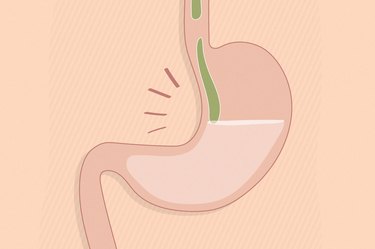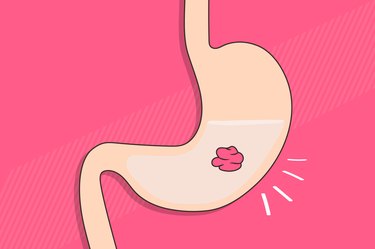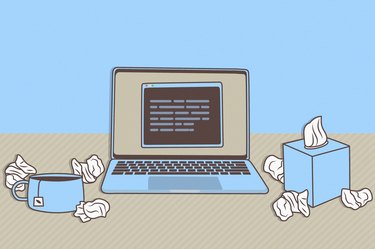
Sticky and slimy, mucus gets a bad rap for being icky. But when you feel it building up in the back of your throat, it's got to go somewhere. So is it OK to just...swallow it?
Mucus or phlegm is the lubricating substance that lines the surface of your lungs, mouth, sinuses, stomach and intestines. It's made mostly of water plus proteins and some sugar, and your body relies on it to keep your tissues from getting too dry, as well as to trap and remove bacteria, viruses or other particles that could make you sick, says Aron Kandinov, MD, an otolaryngologist with ENT and Allergy Associates in Brooklyn, New York.
Video of the Day
Video of the Day
So the gross goop, it turns out, is actually good for you. But that doesn't necessarily mean you want to be downing big gulps of snot. Here's why.
No, It Isn't Bad to Swallow Mucus (but It Can Be Annoying)
The body is constantly making a fresh supply of mucus, and there's always a little bit dripping slowly but steadily down your throat. (That's how it gets to your digestive tract to act as a lubricant, Dr. Kandinov points out.) Normally, this happens without you even noticing it, so it's not a problem. "Swallowing mucus is not dangerous," Dr. Kandinov says.
Mucus production ramps up when your immune system is trying to fight something off, though. "When sick or reacting to allergies, the body secretes more mucus as a means of increasing that barrier and clearing the pathogens, which often drips down the back of the throat and is swallowed," explains Dr. Kandinov. This isn't harmful either.
But it isn't always comfortable. In addition to making more mucus when you're sick, the mucus tends to be thicker and stickier than normal. That can irritate your throat and even make your voice a little hoarse. And if you're really swallowing a lot of mucus, your stomach might feel a little off, Dr. Kandinov says.
Still, there's no evidence that swallowing mucus makes a cold or illness last longer (no matter what your mother might have told you). And swallowing mucus doesn't cause diarrhea or make a cough worse. Finally, if you swallow phlegm, it does not go back into your lungs (it goes down into your digestive tract, as we noted above).
How to Get Rid of Excessive Mucus
A phlegm factory in full production mode can leave you a little uncomfortable at a time when you're likely already not feeling your best. But there are some steps you can take to curb your production and ease your symptoms.
- Use a nasal saline spray or rinse. A spritz of salt water can clear out mucus quickly and keep gobs of it from collecting in your nasal passages, Dr. Kandinov says. Try SinuCleanse Sterile Saline Nasal Mist ($11.30, Amazon).
- Put a warm, moist towel on your face. The moist heat can help thin mucus, allowing it to clear out quicker.
- Run a humidifier. Adding moisture to your indoor air may help your body make less mucus, according to the Cleveland Clinic. (Check out LIVESTRONG.com's roundup of the best humidifiers.)
- Pay attention to your diet. Warm liquids and broth-based soups can help break up mucus, while for some people, certain foods can make mucus production worse.
- Try an over-the-counter med. Expectorants like Mucinex ($22.49, Amazon) will thin mucus so it drains out of your chest more easily, while decongestants like Sudafed ($13.23, Walmart.com) or Sinex ($17.94, Amazon) help your body produce less mucus overall (but using them too often can have a rebound effect). If your mucus is caused by allergies, try an antihistamine like Zyrtec ($11.49, Amazon) or Claritin ($19.82, Walmart.com).
So, How Bad Is It Really to Swallow Mucus?
Downing a little phlegm isn't going to hurt you. In fact, you're swallowing mucus every day without even realizing it. But having a lot of mucus running down your throat can make it sore and give you a stomachache, says Dr. Kandinov.
So if you're really clogged up from a cold or allergies, taking measures to clear out some of the excess might keep you a little more comfortable.
Was this article helpful?
150 Characters Max
0/150
Thank you for sharing!
Thank you for your feedback!
Is this an emergency? If you are experiencing serious medical symptoms, please see the National Library of Medicine’s list of signs you need emergency medical attention or call 911.



